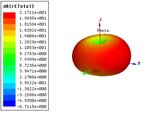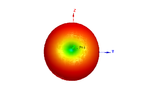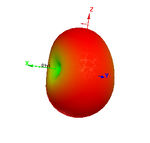frodonet
Member level 2

Hi Guys,
I need some help in plotting the E-field and H-field in HFSS.
How do we exactly plot E-field and H-field in HFSS? The problem is that i have read many number of threads and even searched in google but there's no clear instruction on how to plot this.
As far as i understand, here how it goes as per my understanding. Both E-field and H-field are orthogonal. Since i'm designing a microstrip planar antenna thus my e-field is directing towards the Z-axis. So, to plot E-field. I set phi =0 and theta = all angles. This way i can see x-z plane for E-field.
For H-field. I set theta =0 and phi = all angles. This way i can see the x-y plane for H-field. I am unsure of both of these are 100% correct. And then i read something about rE and rEphi functions that help to plot E-field and H-field.
Another part of my confusion is that the relation of gain to my E-field and H-field. I don't really understand how gain are related to these 2 fields. This is because, when i plot out my radiation pattern gain, i set phi = 45 degrees and then investigate for theta =0,45,90 degrees. Seems like my when my theta is 0, my gain drops dramatically meaning that it's not omnidirectional.
Thus, what confuses me is what is the relation between E-field/H-field to Gain radiation pattern.
I need some help in plotting the E-field and H-field in HFSS.
How do we exactly plot E-field and H-field in HFSS? The problem is that i have read many number of threads and even searched in google but there's no clear instruction on how to plot this.
As far as i understand, here how it goes as per my understanding. Both E-field and H-field are orthogonal. Since i'm designing a microstrip planar antenna thus my e-field is directing towards the Z-axis. So, to plot E-field. I set phi =0 and theta = all angles. This way i can see x-z plane for E-field.
For H-field. I set theta =0 and phi = all angles. This way i can see the x-y plane for H-field. I am unsure of both of these are 100% correct. And then i read something about rE and rEphi functions that help to plot E-field and H-field.
Another part of my confusion is that the relation of gain to my E-field and H-field. I don't really understand how gain are related to these 2 fields. This is because, when i plot out my radiation pattern gain, i set phi = 45 degrees and then investigate for theta =0,45,90 degrees. Seems like my when my theta is 0, my gain drops dramatically meaning that it's not omnidirectional.
Thus, what confuses me is what is the relation between E-field/H-field to Gain radiation pattern.












